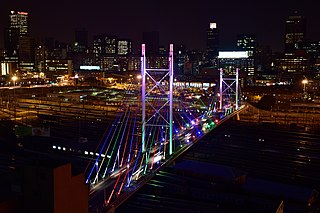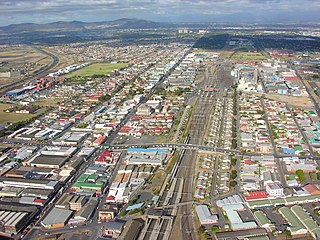Related Research Articles

Pretoria, is South Africa's administrative capital, serving as the seat of the executive branch of government, and as the host to all foreign embassies to South Africa.

Rhodesia, officially from 1970 the Republic of Rhodesia, was an unrecognised state in Southern Africa from 1965 to 1979. During this fourteen-year period, Rhodesia served as the de facto successor state to the British colony of Southern Rhodesia, and in 1980 it became modern day Zimbabwe.

Johannesburg is the most populous city in South Africa with 4,803,262 people, and is classified as a megacity; it is one of the 100 largest urban areas in the world. It is the provincial capital of Gauteng, the wealthiest province in South Africa. Johannesburg is the seat of the Constitutional Court, the highest court in South Africa. Most of the major South African companies and banks have their head offices in Johannesburg. The city is located within the mineral-rich Witwatersrand hills, the epicentre of the international-scale mineral, gold and (specifically) diamond trade.

The prime minister of South Africa was the head of government in South Africa between 1910 and 1984.

The University of the Witwatersrand, Johannesburg, commonly known as Wits University or Wits, is a multi-campus public research university situated in the northern areas of central Johannesburg, South Africa. The university has its roots in the mining industry, as do Johannesburg and the Witwatersrand in general. Founded in 1896 as the South African School of Mines in Kimberley, it is the third oldest South African university in continuous operation.

Kaizer Chiefs Football Club are a South African professional football club based in Naturena, Johannesburg South, that plays in the Betway Premiership. The team is nicknamed AmaKhosi, which means "Kings" or "Chiefs" in Zulu, and the Phefeni Glamour Boys. Chiefs have won 13 league titles and over 42 cup trophies. The club's most recent trophy was the Shell Helix Ultra Cup trophy it won on 12 October 2019. As a result, they hold the most trophies amongst all clubs in South Africa and are the most successful team in South African football history since the start of the top flight in 1970. They are the most supported club in the country, drawing an average home attendance of 16,144 in the 2019–20 season, the highest in the league. It led to them being dubbed "The Biggest Club" in Southern Africa. The team plays its home matches at the 94,797-capacity FNB Stadium.

Limpopo is the northernmost province of South Africa. It is named after the Limpopo River, which forms the province's western and northern borders. The capital and largest city in the province is Polokwane, while the provincial legislature is situated in Lebowakgomo.

Midrand is a town in central Gauteng, South Africa. It is situated in-between Centurion and Sandton. Formerly an independent municipality, Midrand now forms part of the City of Johannesburg Metropolitan Municipality.

The deputy presidentof South Africa is the second highest ranking officer of the executive branch of the Government of South Africa. The deputy president is a member of the National Assembly and the Cabinet.

Apartheid was a system of institutionalised racial segregation that existed in South Africa and South West Africa from 1948 to the early 1990s. Apartheid was characterised by an authoritarian political culture based on baasskap, which ensured that South Africa was dominated politically, socially, and economically by the nation's minority white population. In this minoritarian system, there was social stratification and campaigns of marginalization such that white citizens had the highest status, with them being followed by Indians as well as Coloureds and then Black Africans. The economic legacy and social effects of apartheid continue to the present day, particularly inequality.

The South Africa Act 1909 was an act of the Parliament of the United Kingdom that created the Union of South Africa out of the former Cape, Natal, Orange River, and Transvaal colonies. The Act also allowed for potential admission of Rhodesia into the Union, a proposal rejected by Rhodesian colonists in a 1922 referendum. The draft proposal was supported by the four colonial parliaments, but was opposed by Cape Colony premier W. P. Schreiner, who raised concerns that it would strip rights from non-white South Africans.
The Shell House massacre was a 1994 shooting incident that took place at Shell House, the headquarters of the African National Congress (ANC), in central Johannesburg, South Africa in the lead up to the 1994 elections.

South Africa, officially the Republic of South Africa (RSA), is the southernmost country in Africa. It is bounded to the south by 2,798 kilometres (1,739 mi) of coastline that stretches along the South Atlantic and Indian Ocean; to the north by the neighbouring countries of Namibia, Botswana, and Zimbabwe; and to the east and northeast by Mozambique and Eswatini. It also completely enclaves Lesotho. It is the southernmost country on the mainland of the Old World, and the second-most populous country located entirely south of the equator, after Tanzania. As of July 2024 South Africa has the largest economy in Africa. South Africa is a biodiversity hotspot, with unique biomes, plant and animal life. With over 62 million people, the country is the world's 23rd-most populous nation and covers an area of 1,221,037 square kilometres. Pretoria is the administrative capital, while Cape Town, as the seat of Parliament, is the legislative capital. Bloemfontein has traditionally been regarded as the judicial capital. The Constitutional Court, the country's highest court, is located in Johannesburg. South Africa is ranked among the leading democracies in Africa as per the economist democracy index.
Cape Town Opera (CTO) is a professional opera company in Cape Town, South Africa. CTO was founded in 1999 by the management and staff of the former South Africa Arts Council Opera and the Cape Performing Arts Board (CAPAB), itself a successor to the Cape Province Performing Arts Council and the previous Opera School at the South African College of Music at the University of Cape Town, which had been founded in the early 1920s under the Italian tenor Giuseppe Paganelli.

The University of Pretoria is a multi-campus public research university in Pretoria, the administrative and de facto capital of South Africa. The university was established in 1908 as the Pretoria campus of the Johannesburg-based Transvaal University College and is the fourth South African institution in continuous operation to be awarded university status. The university has grown from the original 32 students in a single late Victorian house to approximately 53,000 in 2019. The university was built on seven suburban campuses on 1,190 hectares.

Nickelodeon is a South African 24-hour television channel owned by Paramount Networks EMEAA. The channel was launched on July 1, 2008. North Africa receives the Arabic-language version of the channel Nickelodeon MENA.

Highstead is a village near Chislet, off the A299 road, in the Canterbury District, in the English county of Kent. It is near the town of Herne Bay. Highstead is known for its iron-age pottery findings.

South Sudan, officially the Republic of South Sudan, is a landlocked country in East Africa. It is bordered on the north by Sudan; on the east by Ethiopia; on the south by the Democratic Republic of the Congo, Uganda and Kenya; and on the west by Central African Republic. South Sudan's diverse landscape includes vast plains and plateaus, dry and tropical savannahs, inland floodplains, and forested mountains. The Nile River system is the defining physical feature of the country, running south to north across its center, which is dominated by a large swamp known as the Sudd. South Sudan has a population of 12.7 million. Juba is the capital and largest city.

Maitland is a suburb of Cape Town, South Africa.
The National People's Party was a South African political party founded in 1981 by Amichand Rajbansi. It participated in political structures established for Indian South Africans during the apartheid era: first the South African Indian Council, and then the House of Delegates in the Tricameral Parliament.
References
- ↑ "Highstead". www.thepresidency.gov.za. Archived from the original on 12 April 2012. Retrieved 20 May 2012.